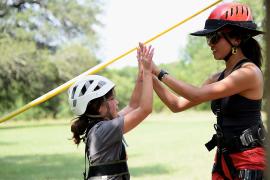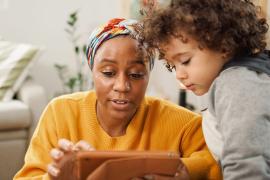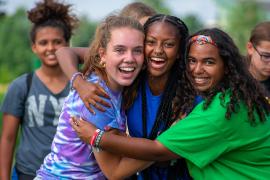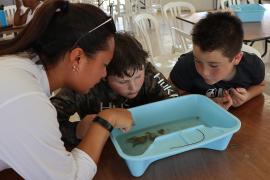Camp teaches . . . and we do it really well. So well in fact that the kids have no idea they are learning. Camp is a kid-tested and parent-approved classroom with a curriculum that delivers daily lessons in resilience, diversity, problem-solving, collaboration, communication (the kind that doesn’t happen through a device), flexible thinking, and so much more. We build an inclusive community where kids can be confident that they belong, that they will be respected, and that they are among friends.
I don’t know how our current reality is going to play out in the lives of our kids. What I do know is that our kids will be moving forward with a continued need to navigate new expectations, new rules, and new ways of doing everything from play dates to school reading groups. I sincerely hope that our kids will also be moving forward with opportunities to take part in more intentional conversations about race, equity, and our responsibility to care for one another.
Camp is more essential than ever.
Community and Connection
"I’ve spent nearly as much time trying to understand the strange appeal of summer camp as I have the appeal of a talking mouse who favors red shorts. Quite frankly, I’m still stumped about the mouse. But I think I’ve figured out the amazing allure of summer camp . . . When all is said and done, people of all ages want to be a part of something bigger and more important than themselves."
— Michael Eisner, former CEO of the Walt Disney Company
What Eisner was speaking to is the unique ability of camp to engender a sense of community among those who are lucky enough to take part in the traditional camp experience. The kind of community that is not defined solely by proximity with one another, but rather by genuine connection, shared interests and experiences, a common sense of purpose, and respect among its members.
Unfortunately, despite our best efforts, the sense of community and genuine connection that our kids have been able to derive from things like school, religious organizations, and sports teams has been greatly diminished in recent months, if not altogether eliminated.
This has left a significant gap in an area that is fundamental to our kids' sense of social-emotional health and overall wellbeing. Schools, religious organizations, and sports teams all build a sense of community and connection as a secondary goal behind learning, spirituality, skill-building, etc. At camp, a sense of community and connection is our primary goal. The other learning and social-emotional outcomes of camp are then able to follow organically and seamlessly (or at least that’s how we make it feel to campers).
Camp is more essential than ever.
A Sense of Belonging
Think about that feeling in your stomach when you walk into a meeting, social gathering, or any other situation where you just knew you didn’t belong. If you are like most people, this feeling did not make you want to try something new, openly share something personal, or engage in just about anything that would resemble a pro-social behavior. A sense of belonging is a basic human need and of vital importance during our kids’ developmental years (it’s also important beyond those years . . . but that’s for another day).
When this need is met for our campers, they are more likely to:
- Have the confidence to try new things
- Display resilience in the face of adversity
- Be comfortable being themselves and demonstrate respect for others doing the same
- Show empathy toward their peers
- Act selflessly to support the goals and needs of the group
For young people, a sense of belonging is even more important during periods of transition (e.g., beginning to emerge from a pandemic-driven quarantine) and if they identify with a group that they feel is unfairly or under represented. Ensuring that our campers feel a sense of belonging is foundational to the camp experience. Our staff model, coach, and reinforce behaviors that support inclusivity, kindness to others, respect for our differences, and empathy toward others.
At camp, not only will your child be made to feel like they belong, but they will be given the tools and opportunity to practice the skills necessary to make others feel the same.
Camp is more essential than ever.
Reinforcing a Growth Mindset
"Love challenges, be intrigued by mistakes, enjoy effort, and keep on learning."
— Carol Dweck, Professor of Psychology at Stanford University
This quote is the basis for what Carol Dweck and others refer to as a growth mindset. People with a growth mindset believe that their talents, abilities, and intelligence can all be developed through effort, persistence, and learning (people with a fixed mindset think these things are more innate and cannot be changed). By now, I’m guessing you’ve noticed a trend in this post . . . and yes, camp is a perfect environment for supporting and developing a growth mindset.
We encourage campers to stretch themselves outside of their comfort zones (trying new things, meeting new people), be comfortable making mistakes, persevere when things don’t go their way, and celebrate the success of others. Through the camp experience, kids learn that things don’t always go your way, failures are a normal part of life and learning, being resilient leads to success, and it is smart to ask for help from others.
We have all experienced setbacks and challenges over the past few months. Chances are, the next few months may include more of the same. A growth mindset can help our kids better manage the emotional toll that this can have and come out stronger on the other side.
Camp is more essential than ever.
The choice on whether to send your child to camp is more personal than ever. The deciding factors for the summer of 2020 extend beyond finances, schedules, camp programs, and where friends are going. If you are interested in learning more, I encourage you to reach out to a summer camp in your area. Ask what procedures they have in place to help protect against the spread of COVID-19. The answer should be readily available from whomever answers the phone, applicable to the nature of the camp program, and based on CDC guidelines. The camp should welcome your questions and be more interested in ensuring it’s the right fit for your family than filling a spot at camp.
Continue to model taking care of yourself, your family, and the communities that are most important to you. Our kids are resilient and, with our support, they will be OK when this is all over.
Mark Orens is the Team Leader, Bar-T Kids Club in Maryland and co-chair of the ACA, Chesapeake Local Council of Leaders.
The views and opinions expressed by contributors are their own and do not necessarily reflect the views of the American Camp Association or ACA employees.




